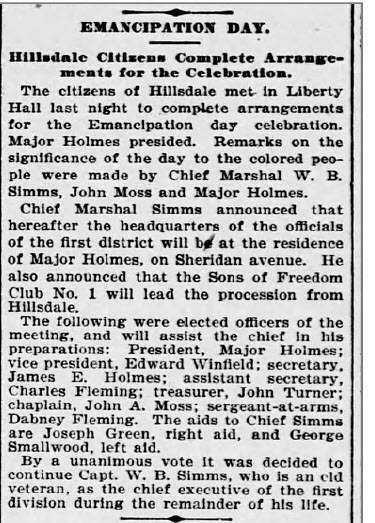So
Dabney (Abner) is seen in the record supporting the claims of his friend, Mr.
Goodlow, whom he most likely had known even during slavery, along with Milton
Johnson. It appears that Goodlow's claim was recognized and he did begin
to receive the proper pension for the injuries he sustained during the war.
MORE TIMES, MORE LIFE
The following is a collage of various incidents that were documented
in various sources relating to Dabney (Abner) and family:
Bootlegging in the Hood
I mentioned a Mr. Spencer Coleman which the record shows also gave testimony on
behalf of Goodlow. He was a well-known resident of Hillsdale during
Dabney's time and ran what was called a "little country
grocery store" in the community. In that age and time folk did
many things to supplement whatever income they had by various means. One
of these avenues was bootlegging. There is an account of Mr.
Coleman's store being raided by police at which time they discovered beer on premises
that he was not allowed to sell. This was in 1894, well before the prohibition
period of the s1920's. Some of Dabney’s close associates were apparently
caught up in the sting, he himself seems to have been unattached.
Emancipation Day Celebration Preparations in Hillsdale
I
In the March 3, 1898 edition of The Evening Star newspaper, there is an article highlighting the story of the Hillsdale
residents in a community meeting making arrangements for the celebration of
"Emancipation Day". In this group, one of the Dabney's (Sr. or Jr., we really can't tell) is listed as sergeant-at-arms and Charles Flemmng, one of Dabney Sr's sons is listed as treasurer. I originally thought that this
planning was for the celebration of “Juneteenth”. Deriving
its name from combining "June" and "nineteenth",
Juneteenth is celebrated on the anniversary of General Order No. 3, issued
by Major General Gordon Granger on June 19, 1865, proclaiming freedom for
slaves in Texas. [1] Originating in Galveston, Juneteenth has since been
observed annually in various parts of the United States, often broadly
celebrating African American Culture. However, the actual celebration
that the Hillsdale residents mentioned in this article were preparing for was
D.C.’s Emancipation Day.
On April 16, 1862, President Lincoln signed a bill ending slavery in the
District of Columbia. This bill passed a full 8 ½ months before he issued his
Emancipation Proclamation. The celebration being prepared for by the
Hillsdale community commemorated the passing of this act, which was called the
District of Columbia Emancipation Act. It was signed into law well before
Juneteenth (June 19, 1865). This brought to an end slavery in the
District of Columbia, which had long drawn the ire of many, and which had been
called “the national shame”, slavery in the nation’s capital. The act
provided for immediate emancipation of enslaved individuals in DC, but at the
same time it allowed for payment to former slaveowners who were loyal to the
Union, a sum of up to $300 for each freed slave. Additionally, if any
former slave wanted to leave the United States, assistance for such a move
would be accommodated, and payments of up to $100 to each former slave
volunteering for this emigration would be possible. This was the “Emancipation
Day” commemoration that the Hillsdale group was preparing. It focused on
celebration the DC Emancipation Act of 1862.
Having had firsthand knowledge of the ills of slavery, it is not inconceivable
that Dabney Sr. may have conveyed stories to his sons (who were all born after
slavery ended) about just how things were during slavery. No doubt they would have been
all in for participation in this activity of planning and celebrating a truly memorial occasion. However, it is possible that the Dabney mentioned in
the article was Dabney Sr. He would have been around 73 at the
time. The article is below.


 Page 9
Page 9